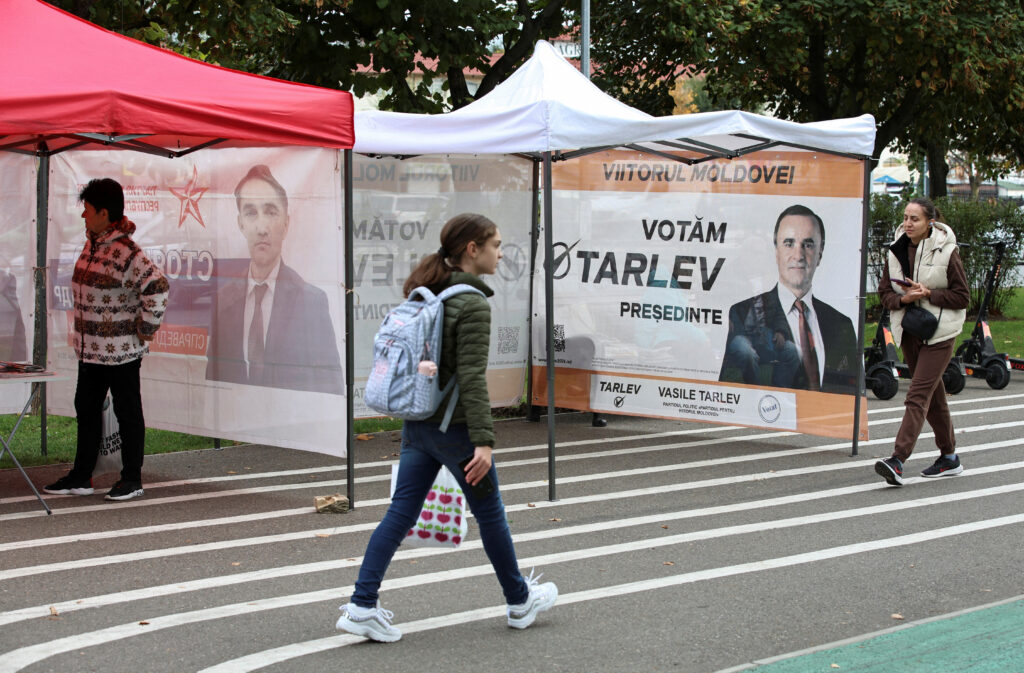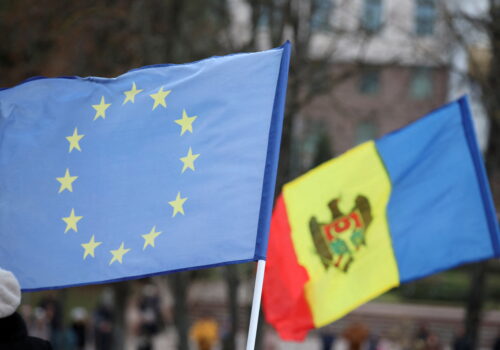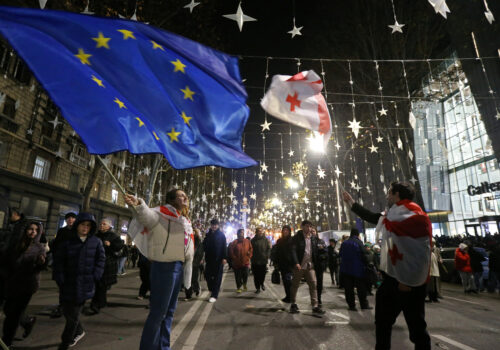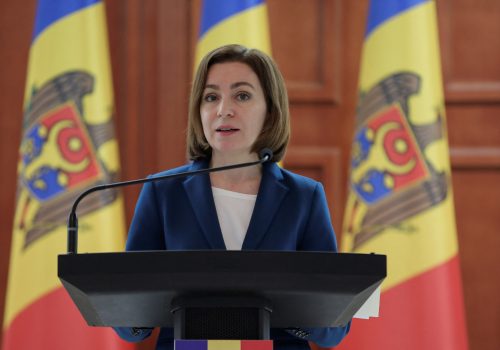On October 20, Moldova faces a pivotal election that could reshape its future. A small republic in Eastern Europe, seemingly insignificant on the global scale, Moldova is engaged in an existential struggle for its democratic future—with Russia playing an open and unprecedented role in trying to sway the outcome.
Moldovans will vote on pro-Western President Maia Sandu’s bid for re-election alongside a referendum on whether to add the goal of European Union (EU) membership to the constitution. These elections are happening against the backdrop of Russia’s ongoing war in neighboring Ukraine, making the stakes particularly high. The outcome is being closely watched by international actors such as the EU and the United States, both of which have warned of Russian interference and hybrid threats aimed at destabilizing Moldova. As a country located at a strategic crossroads between the West and Russia’s self-styled sphere of influence, Moldova has been a key target for disinformation campaigns and other forms of foreign manipulation.
The results of this election will either bolster Moldova’s resilience against external pressures or leave it more vulnerable to foreign influence. Ultimately, the vote will play a decisive role in shaping Moldova’s political direction, security, and international alliances, with long-lasting implications for the country’s trajectory.
A victory for pro-Western forces would strengthen Moldova’s alignment with the West, while a win for pro-Russian factions could increase security risks by aligning Moldova more closely with Russia’s regional agenda.
Although Moldova is a young republic, it has earned recognition as a functioning electoral democracy, with all the elements that come with such a status. The country regularly holds elections and boasts a dynamic multi-party political system. Since the end of the Cold War, Moldova has shown its capacity for peaceful transitions of power between rival parties. Even during politically turbulent moments, like the 2009 “Twitter Revolution,” which shifted the leadership from a pro-Russian to a pro-European government, the democratic process remained orderly and intact.
For all the internal and external challenges Moldova has faced, it has managed to preserve the core principles of an electoral democracy. This time, however, it might be a different story.
Under the shadow of corruption and foreign interference
The October 20 elections are taking place in an environment clouded by what could be the largest case of electoral bribery in Moldova’s history. For months, Moscow has been actively involved in propping up certain factions within Moldova.
Millions of dollars in cash have reportedly been smuggled into the country by individuals connected to the fugitive, US-sanctioned oligarch Ilan Shor, circumventing law enforcement efforts to stop the illegal flow of funds. Authorities had organized searches at the airport to halt this parade of individuals traveling to Moscow to bring back clandestine cash. However, Russia has found other ways to channel funds into Moldova. Through the Russian MIR payment system, financial resources are reportedly now being funneled to Moldovan voters, especially through the financial networks in the Transnistria region—a breakaway territory that has long served as a base for Moscow’s influence operations.
Moldovan authorities have raised alarms about large-scale vote-buying, with the General Police Inspectorate documenting cases of bribery involving at least 130,000 citizens and more than fifteen million dollars in illicit transfers from Russia in September alone. In reality, the scale might be significantly bigger, with some officials estimating it at around $100 million for the entire campaign.
Funds are being funneled into schemes designed to establish a national vote-buying network, resembling financial pyramids with intricate layers of transactions aimed at evading scrutiny. These funds range from “social” allowances for Moldovan pensioners to salary “bonuses” for employees of local government structures in the autonomous territory of Gagauzia. The money is now also, according to police and independent reporting, finding its way into the hands of so-called local “coordinators” and “supporters” of the “Victory” electoral bloc, a political entity created in and reportedly controlled from Moscow.
But it’s not just money that’s flowing into Moldova; disinformation is also playing a pivotal role in this election. The Atlantic Council’s Digital Forensic Research Lab is tracking the spread of fake letters purportedly from public institutions and the incitement of hate speech and media attacks. Using communication tools such as Telegram, Moscow’s operatives are apparently paying individuals to generate and distribute disinformation on a massive scale. For example, a chatbot called “STOP UE/СТОП ЕС” is designed to recruit individuals against the EU referendum. In exchange for completing simple tasks—such as posting on Facebook, recruiting others, and convincing voters to vote against EU integration—participants can earn up to $280, if the majority of people at their polling station vote against the EU referendum. Moldovan police revealed this month that payments for the anti-EU campaign, organized via Telegram, are illegally made through a sanctioned Russian bank, with funds from a Russian nongovernmental organization called “Evrazia” (Eurasia), ranging from fifty dollars per month for “supporters” to more than $2,500 for regional “leaders.” This method of recruiting and paying “ambassadors” has been used widely across Moldova, including in Gagauzia and Chișinău, with multiple similar chatbots reported.
The scale of disinformation being spread in the run-up to this election is unprecedented in Moldova. The Kremlin’s goal appears to be to overwhelm voters with so much misleading information that they are unable to discern truth from lies, and ultimately to erode confidence in Moldova’s democratic institutions.
Not-so-secret foreign meddling
What is particularly alarming is the direct involvement of the Russian Federation. Unlike previous elections in which Moscow’s influence was more subtle, this time, the Kremlin has made no effort to hide its role as the main financial backer of certain political campaigns. Russia’s overt involvement raises serious concerns about Moldova’s sovereignty and the fairness of its elections. The Kremlin is not just supporting pro-Russian factions; it is actively seeking to reshape Moldova’s political landscape to serve its own geopolitical interests.
The “Evrazia” nongovernmental organization, which is transparent about its role in channeling funds into Moldova, has direct ties to the Kremlin and is led by Alyona Arshinova, a legislator in the Russian Duma and vice president of the ruling United Russia party.
Moscow’s efforts to influence the presidential election and constitutional referendum are strategically aimed at delegitimizing this crucial democratic exercise and discrediting the very idea of European integration.
For years, Russia has viewed Moldova’s pivot to European integration as a threat to its regional influence. Now, it is pulling out all the stops to disrupt this process, using financial, political, and media tools to create divisions within Moldovan society. Russia’s goal is clear: to pull Moldova back into its sphere of influence by any means necessary.
Moldova’s democracy hangs in the balance. The integrity of its electoral system, its institutions’ sovereignty, and its citizens’ trust are all on the line.
Victoria Olari is a research associate for Moldova with the Atlantic Council’s Digital Forensic Research Lab.
Further reading
Fri, Oct 11, 2024
Dispatch from Moldova: With elections approaching, Moscow is taking aim at Chișinău’s pro-European path
New Atlanticist By Shelby Magid
Russian influence campaigns are working to sway votes ahead of the October 20 election, which will include a referendum on enshrining EU membership as a goal in Moldova’s constitution.
Thu, Jan 4, 2024
With Russia focused on Ukraine, Georgia should forge ahead boldly with its Euro-Atlantic ambitions
New Atlanticist By
Georgian officials should recognize the present opportunity to advance stronger ties with Europe and the United States, especially ahead of Georgian elections this year.
Fri, May 5, 2023
To secure the Black Sea, the West must help Moldova stand up to Russian aggression
TURKEYSource By Arnold C. Dupuy
Moldova is working on orienting itself more closely with the West, but it needs support to fend off Russian pressure and attempts to gain influence.
Image: Pedestrians walk past campaign tents of Moldovan presidential candidates Vasile Tarlev and Alexandru Stoianoglo, set up in a street ahead of the country's upcoming presidential election and a referendum on future European Union membership, in Chisinau, Moldova October 15, 2024. REUTERS/Vladislav Culiomza



